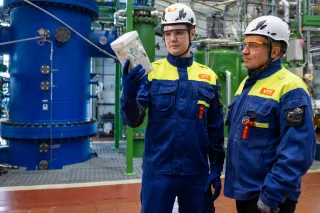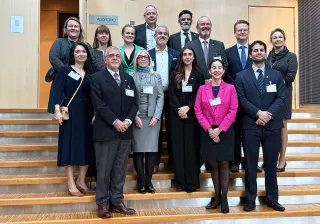Sustainable fuels could play an important role in reducing transport emissions even as electric vehicles become cheaper says a new study from VTT and the University of Cambridge Judge Business School.
While electric vehicles are becoming cheaper, sustainable fuels could also play an important role in reducing transport emissions in order to meet climate-change goals.
Sustainable fuels have much potential to help decarbonise road transport in the near term, particularly for use by long-range vehicles, according to the study published 9 September in Joule, a leading journal focusing on sustainable energy published by Cell Press.
The research says, in effect, that while policymakers are rightly enthusiastic about the potential for electric vehicles to cut road emissions, we should not lose sight of the limitations of such vehicles for long-haul transport and the corresponding need to also develop sustainable fuels.
The study and its conclusions are based on what the authors believe is the first like-for-like comparison of near-term costs of various road-transport decarbonisation options including battery electric vehicles (BEVs) and carbon neutral synthetic fuels (CNSFs), which can be divided into fuels produced from biomass via gasification and electrofuels produced from CO2 and water using electricity.
Although already competitive over short distances, longer-range BEVs are found likely to remain more expensive than CNSFs even if low battery costs are achieved.
The study says it is therefore a priority to develop and test a "portfolio" of different CNSF options in order to identify the most promising future technologies to cut transport emissions. There are currently no commercial-scale CNSF projects.
Of the fuel options examined in the new study, synthetic biofuels produced from woody biomass were identified as being more competitive than electrofuels at the present time.
"Converting CO2 from being a pollutant to a fuel has immediate appeal to many," says the study's lead author, Dr Ilkka Hannula of VTT. "However, electrofuels will remain expensive in the near term and are difficult to scale up in the longer term. Although wind and solar have already reached cost parity with fossil energy in electricity in certain regions globally, they are still far from reaching cost parity with crude oil in transport."
"The research shows that we need to pursue all transport decarbonisation options far more aggressively," says study co-author Dr David M. Reiner, University Senior Lecturer in Technology Policy at Cambridge Judge Business School.
"These efforts should be technology-neutral as to whether breakthroughs happen with wood chips, CO2utilisation or electric vehicles, as long as they meet basic sustainability standards. At this stage, the important thing is to have a wide portfolio where we focus on learning-by-doing and economies of scale", he continues.
The study entitled "Near-term potential of biofuels, electrofuels and battery electric vehicles in decarbonising road transport" is co-authored by Dr Ilkka Hannula of VTT and Dr David M. Reiner, University Senior Lecturer in Technology Policy at Cambridge Judge Business School and Assistant Director of the Energy Policy Research Group at the University of Cambridge.
Ref: DOI: 10.1016/j.joule.2019.08.013
Direct link: https://www.cell.com/joule/fulltext/S2542-4351(19)30416-7



